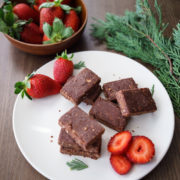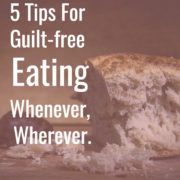Guilt: A cognitive or an emotional experience that occurs when a person believes or realizes—accurately or not—that he or she has compromised his or her own standards of conduct or has violated a moral standard and bears significant responsibility for that violation. (source: Wikipedia)
…..
I used to feel guilty after eating… Maybe not all the time, but a lot of the time.
I would feel guilty after eating some chips at a party or some ice-cream after dinner. At one point I even started to feel guilty after eating bread!
It’s a tricky situation because on one hand I knew that I shouldn’t be so harsh on myself. Afterall, I eat fairly well most of the time and I exercise regularly too. But on the other hand I just couldn’t help myself.
So I decided to do something about it.

I mean, as I food blogger I’m continually surrounded by food. I cook them, shoot them, photograph them, talk about them, and eat them. It’s what I love to do.
So I want to, I need to, stop beating myself up everytime I eat something more that a salad or a smoothie. I need to be at peace with myself and with the food I’m eating, whatever it might be.
Though it’s still an ongoing journey for me, I can gladly say that I’ve made huge progress. No more self-loathing and shame after eating, well, most of the time anyway. Occasionally shame creeps in, but I can quickly recognise it’s face and kick it out the door. What’s interesting is that, since I made a conscious effort to stop feeling guilty after eating, I’ve eaten less bad food as a result. Go figure.
So I thought I should share some of the lessons I’ve learned from overcoming this ‘food guilt’. If you have guilt and shame issue in relation to food (or you know someone who does), this post might be helpful to you. You too can free yourself of shame and self-loathe after eating anything. No complicated formula, just a few simple tips and tricks.
But first, let’s dig down to the root of the problem.
Why do people feel guilty after eating?

I think it all boils down to these two things:
- They don’t feel like they deserve or have earned the meal
- They ate something they themselves or the society, generally, label as ‘bad’
When you eat something that you haven’t ‘earned’ or think as ‘bad’ food, you feel like you have rebelled against your better judgement and it triggers that feeling of guilt.
On top of that, our parents, TV, and magazines are all telling that we need to ‘watch what we eat’, ‘not eat too much or we’ll get fat’, and we should be ‘good’.
And we know than when they say ‘good’. They don’t just mean being healthy, but also being ‘slim’.
No wonder so many women around the world have food guilt issues!

But here’s the truth. And it is also the reason why I no longer feel guilty after eating, be it a bowl of ice-cream at 11pm or a warm choc chip hot cross bun slathered thickly with vegan butter…hmmm.
The truth is that: Your health is not defined by just one meal. It is defined by everything else you do. Like getting enough sleep for example, or exercising, or if you’re me, spending an hour every Sunday making green smoothies for the week ahead.
Sure there’s always something ‘better’ or ‘healthier’ to eat. But if you’ve already plan on having pizza night with your friends, then you may as well enjoy it. Tomorrow is a new day. The next meal is a new day.
That said, I believe that it also important to know the difference between feeling guilty to feeling ill, bloated or any other adverse physiological reactions your body have on a particular food, in which case you need to stop eating the food in question and consult your doctor!
As for the psychology part, here’s my tips for getting rid of your food guilt. They work for me so they may work for you too.

1. Earn your meal
If you don’t want to feel guilty after a meal, then you need to work for it. Make it a reward for a task, be it exercise, assignment or any task you wish to complete. It’s very simple and yet so effective. Just think of a celebratory lunch or dinner you had after completing an exam or a gruelling project. Did you feel bad after that event? Probably not.
I remember a couple of weeks ago I earned my weekend lunch (a burger and chips) by walking down to the beach (at least twenty minutes’ hustle) to get it, and then walking back uphill after. It felt good. It felt like I’ve earned my lunch and then some.
I also think that all that walking made food taste so much better. You know what they say, the greater the effort the sweeter the reward.
Try it. Next time you want to eat something indulgent, try to earn it and feel the difference.
2. Make it healthier
Most of the time you feel guilty when you’re eating junk food. So why not make it healthier so you can feel better about it?
And you don’t even have to make a massive change. It can be as small as reducing the portion size or making some minor adjustment to the meal.
Take a burger, for example. There’s no reason why you can’t make a burger healthier while still retaining the delicious taste: perhaps swap the burger patties with mushroom, or skip the burger bun, or ditch the dairy and replace it with hummus or avocado instead, or maybe you can simply ask for extra salad.
These changes, although small, can significantly reduce the guilt feeling you have after the meal.
3. Believe in yourself
In other words, follow your own intuition.
Would you believe if I say that when you allow yourself to can eat whatever you feel like, whenever you feel like it, you’ll end up wanting a variety of food, not just the bad stuff?
No? You don’t think you can be trusted? Then answer this question: “What do you normally have for breakfast”?
You know that you can have chocolate cake for breakfast everyday right? No one is preventing you.
The fact that most of us don’t eat chocolate cake everyday proofs that our intuition is working and that we all have the ability to listen to what our bodies needs. We just need to take those intuitions with us and pay more attention to it. Everything we crave is exactly what our bodies need, including that occasional chocolate bar.
4. See food differently
Food can mean so many things to people. But when it comes down to the basic definition of food, it just means sustenance. All the things we eat, we eat them to stay alive.
Though some food may give us more pleasure than basic survival needs, they all have the same purpose, to keep us moving. Just like the air we breathe and the water we drink.
When you see food in this way, you realise that there is no need to feel guilty over an indulgent meal. The energy has been transferred from the food to your body, your body will metabolise it as best it can and prepare itself for the next meal.
Life goes on. You’ll have plenty of opportunity to to nourish your body again, and again.
5. Be grateful
Last and not least, just be grateful.
Instead than feeling guilty after having a delicious dessert, be grateful for what you have – food.
Yes it is a cliché, but it is so for a reason. A lot of people can’t afford food let alone worry about calories, sugar, fat, grains, non-organic ingredients, whatever. Be grateful that you’re here now, able to eat and enjoy food. You’re still alive. Calories can be burned but you can’t re-live your life. So enjoy it.
And if you’re finding it hard to keep a positive mindset, then maybe learning about the Nocebo effect can change your mind.
Have you heard of Nocebo effect? It is essentially the opposite of Placebos. Placebos induce a positive, beneficial effect, Nocebos induce an adverse effect. And it’s all psychological! Cue the song Zombie here… ‘in your head….in your head… zombie.. zombie…zombie..’
So watch those thoughts. Don’t add unnecessary nocebo effects to your bodies. Better yet, embrace the placebo effect and believe that there’s nothing to worry about. And there’s nothing to be ashamed of.
Because there is no shame in enjoying food.

I hope you’ve found this post helpful. With my wedding only three weeks away, this also serves me as reminder as I prepare for the day, to not stress out every time I indulge and eat a cookie here and there.
If you have any food guilt story or tips you wish to share, leave it in the comment below, I’d love to hear from you.
xKeren















